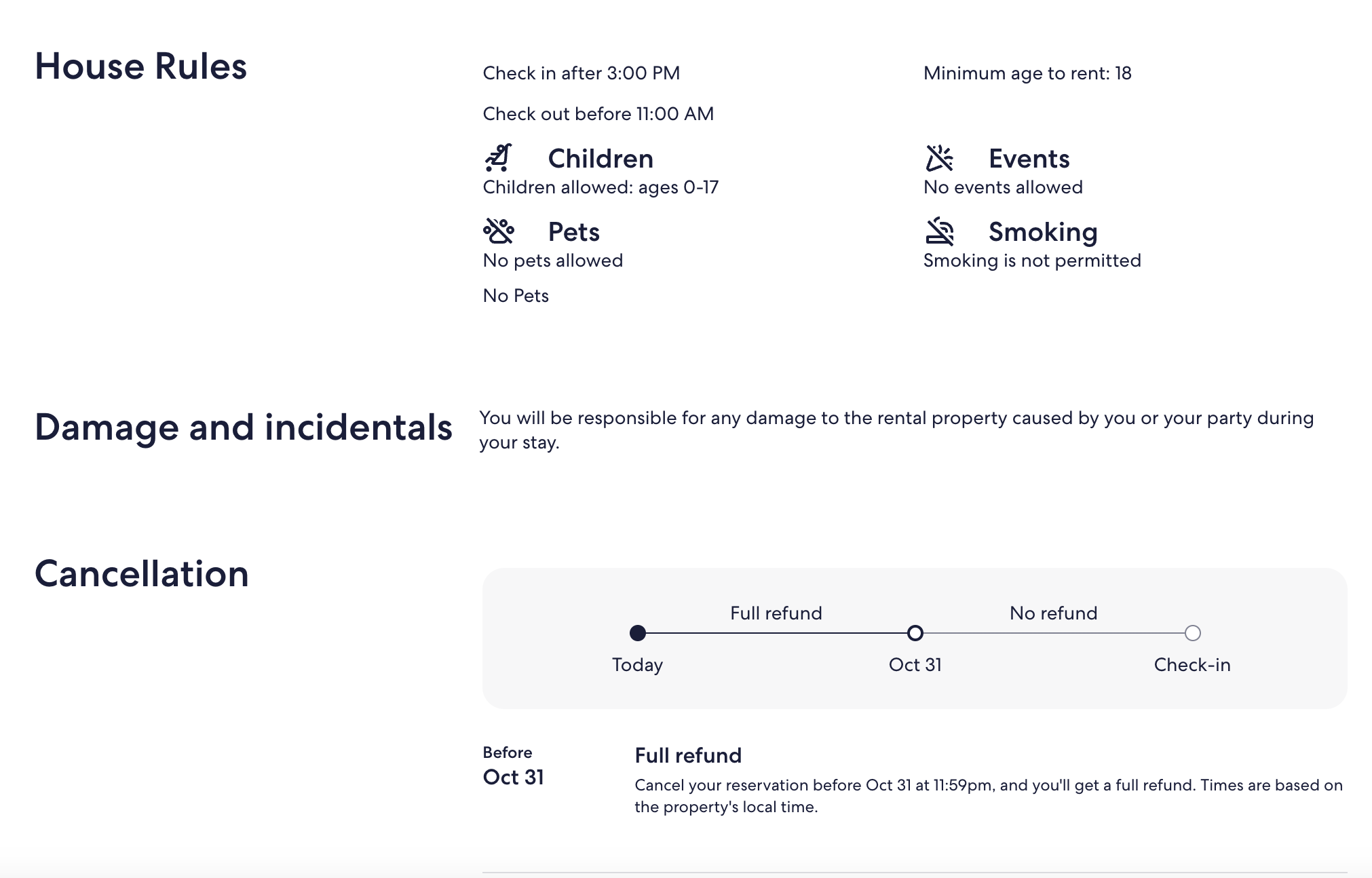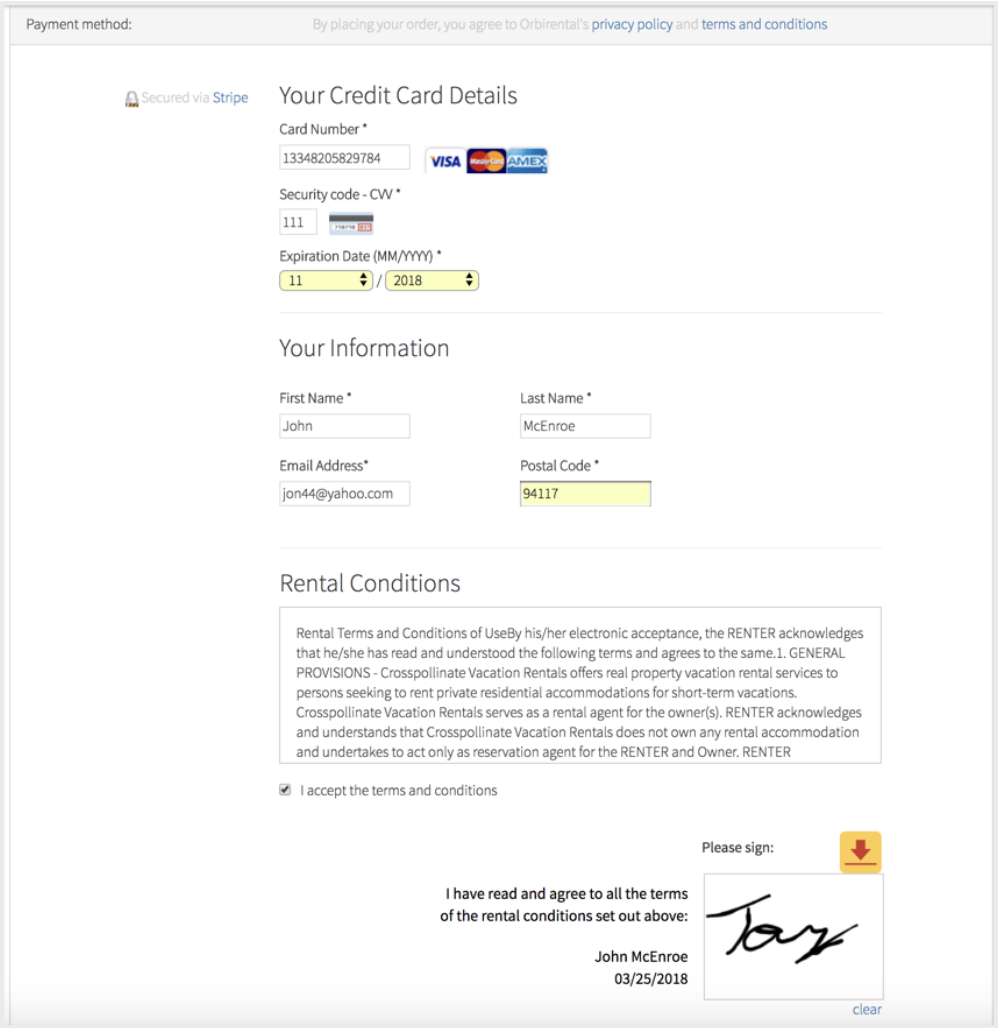Do you think of your Vrbo rental agreement as a mere formality? A well-crafted document is actually the best tool for protecting your vacation home and building trust with guests.
Rental agreements are especially important when it comes to Vrbo. The platform sets itself apart from listing sites like Airbnb and Booking.com by only offering full apartments and houses. Guests are more likely to be families with high expectations who are looking to see that you’re handling the booking process with professionalism.
Let us help you get started. Our guide walks you through everything you need to include in your contract, with a rental agreement template and insights from both experienced property operators and contract law specialists.
Does Vrbo allow rental agreements?
Yes, Vrbo explicitly mentions in its platform policies that rental agreements are allowed. It even enables you to upload the document to your listing as a PDF document, so it’s easier for potential guests to view.
But there’s a caveat: All the terms and conditions in your rental agreement must comply with Vrbo policies and local requirements. For example, you can’t ask guests to purchase insurance and pay a deposit when the platform only says they need one type of damage protection.
Additionally, your contract and your house rules in your listing description must be consistent. If there are any differences, Vrbo will defer to your house rules in a dispute with a guest.

Why a solid Vrbo rental agreement is essential
When Vrbo already has platform policies and house rules, why would you need a rental agreement? You might think it’s just another unnecessary task.
Legal Manager at Faster Draft, Daria Tunranska, says that nothing can provide the level of detail that a legal contract can. “We recommend creating your own agreement rather than relying solely on Vrbo’s internal policies. Vrbo platform terms cover rules, but often don’t address unique local laws or specific landlord-tenant nuances. A tailored agreement protects both hosts and guests more comprehensively.”
As a property operator, Tim Choate, Founder of Red Awning, is inclined to agree. “Although Vrbo’s policies serve as a good starting point, I really think every professional host or operator should have their own rental agreement. The Vrbo framework is designed for consistency; your contract is designed for clarity. The two are not the same.”
Just consider the differences between a remote mountain cabin and a city apartment. A cabin might require terms about wood-burning and snow-clearing, while an urban property is more likely to focus on noise limits, building access, and parking arrangements. While both fall under Vrbo’s general policies, their day-to-day risks couldn’t be more different.
Key elements to include in your Vrbo rental agreement
Here’s what to include in your Vrbo rental agreement to maintain consistency with Vrbo policies and cover all your bases.
Information about both parties
Clearly list the names and contact details of all the parties involved. As the host, you may be required to provide a phone number by law in many jurisdictions, so guests know how to reach you in an emergency.
Vrbo usually only gives you the lead guest’s information. Asking the rest of the renters for their details helps you document everyone who’s staying at your property and spot potential red flags. You can invest in a dedicated guest screening tool to verify identities and conduct a full background check.
Number of guests
State how many guests are booked under this reservation. If there are sleeping areas spare, you can mention the charge for adding extra people at a later time. This clause may deter guests from inviting unauthorized others to your property without saying anything.
Property Details
Include the full address and a brief description of the property, including:
- The number and type of rooms
- The number and size of beds
- Amenities and appliances
- Entrances
- Fire exits
- The outdoor areas
This ensures guests know exactly what they’re agreeing to. For example, some people may expect the beds to be a specific size to suit their comfort levels. Others might be used to having a dishwasher and need a heads-up that they’re not standard in your region.
Cancellation policy
Clearly state your Vrbo cancellation policy and make sure it matches the tier you’ve chosen. Inconsistencies between your listing and your contract not only cause confusion but could also lead to unexpected payouts to guests.
Payment terms
State everything related to payment, including a complete breakdown of:
- The nightly rate
- Transient occupancy taxes
- Additional charges (e.g., cleaning fees, pet fees)
- Acceptable payment methods (e.g., credit card, PayPal)
Being upfront about charges means guests know exactly how much they should expect to pay. They’ll be less likely to cancel the booking or dispute any charges.
Stay duration
Specify the exact dates and check-in and check-out times for the rental period. You should make it clear how flexible or strict you need to be about those times. If you have back-to-back bookings, for example, you need to ensure guests are out promptly so cleaning staff can make the most of the short window to prepare the rental property.
Check-in and check-out processes
Outline the steps guests must follow for check-in and check-out. You can include details like:
- How to access the building
- Which door to use
- Where to find keys or keypads
- Where to leave keys
- How to secure the property
Clear instructions make these processes less stressful for guests. When they understand what to do, they can focus on packing up instead of worrying about how to meet your requirements.
House rules
Go into more detail about the house rules in your listing description. Here are some of the key rules to discuss:
- Noise limits
- Quiet hours
- Cleaning responsibilities
- Smoking areas
- Pet policies
- Amenity use
Just don’t go overboard when setting rules. Although you can expect guests to clean up after themselves, leave the heavy-duty tasks for yourself. For example, you can ask them to take out the trash and do the dishes, but you should handle any laundry.
Damages and security deposits
Tell guests how you handle property damage. You can discuss which Vrbo damage protection you use and what exactly it covers.
Accidents happen, so guests may be nervous about breaking appliances or staining the furniture. Take this as a chance to reassure them. You can explain how insurance or deposits make it easier to manage damages and avoid potential disputes.
Local laws
Reference any requirements that apply to your short-term rental, such as occupancy limits and noise ordinances. This demonstrates to guests the importance of following certain rules.
Additionally, Choate says discussing national and state laws can set the best impression of your short-term rental business. “Guests love transparency,” he says, “And when your agreement is in line with local standards, it makes you more trustworthy.”
Force Majeure
Include a clause in your rental agreement about what will happen if there’s a natural disaster or severe weather. This tells them what to expect if you need to cancel due to a force majeure.
In this section, mention what could cause you to cancel, how you’ll contact them, and how the refund process will be handled.
Signatures
Include signatures from both rental parties to make the contract binding. You can use Property Management Software (PMS) like Hostfully to handle this digitally, so you don’t have to send paperwork backward and forward. When you receive a Vrbo booking, our software automatically sends the message with the document attached and a request for the signature.

Tips for crafting an effective Vrbo rental agreement
Effective agreements are about more than the terms and conditions you include. There are ways to frame the rules and present the document to guests to make the booking process go smoother:
- Strike the right tone: Turanska says to strike a good balance between friendly and professional to put guests at ease. “Something like: To ensure a smooth stay, please review and sign our rental agreement outlining important details.”
- Use clear language: Although you’re creating a contract, avoid legal jargon so everyone can clearly understand your terms. Have someone objective read what you’ve written to check you haven’t used any obscure terms.
- Leverage your brand: Choate says to personalize the document for consistency. “We would suggest delivery of agreements through a branded digital form,” he says, “Positioned as being part of the guest experience rather than a legal barrier.”
- Regularly update the agreement: Keep your terms consistent with changing laws and Vrbo policies. If you don’t stay updated, you risk violating a rule and causing issues for your company.
- Get legal advice: Nothing says you have to handle the paperwork. Get a contract lawyer to draft a document if you feel you don’t have the necessary expertise.
Keep Vrbo rental agreements simple and stress-free with Hostfully PMS
Strong agreements set clear expectations and give both hosts and guests peace of mind. But once you’ve drafted the paperwork, the next step is keeping those documents consistent, accessible, and easy to manage across every booking.
Hostfully PMS takes the friction out of the process. It gives you the tools to organize, automate, and share your agreements without giving you extra work to do.
With Hostfully, you can:
- Request and collect e-signatures automatically when guests confirm bookings
- Keep signed agreements securely stored and linked to each reservation
- Sync listing details everywhere through our channel manager
- Share digital guidebooks that reinforce house policies and FAQs
- Centralize messages so guests always know what to expect
- Manage damage deposits and payments alongside your agreements
By handling the formalities behind the scenes, Hostfully frees you up to focus on delivering a top-notch guest experience that keeps people coming back.
FAQs about Vrbo rental agreements
Is a Vrbo rental agreement legally binding?
Yes, a Vrbo rental agreement is a legally binding document as long as it complies with both the platform policies and local laws. It works like any other contract, outlining rules for you and your guests and clarifying rights and responsibilities.
What’s the difference between a Vrbo rental agreement and house rules?
A Vrbo rental agreement is a contract you upload to your listing that covers a broad range of legal and financial terms. For example, you might include pricing, length of stay, and your maximum occupancy limits. On the other hand, house rules are part of your listing description and only cover how you want guests to treat your vacation rental property.
Can I use my own rental agreement on Vrbo?
Yes, you can use your own rental agreement on Vrbo, provided it doesn’t conflict with the platform’s policies or local laws. Vrbo enables you to upload the document as a PDF to each listing.
What are the most important clauses to include in a Vrbo lease agreement?
The most important clauses to include in a Vrbo lease agreement depend on your unique setup. However, it’s important to include payment terms, cancellation policies, damages, occupancy limits, and house rules at a minimum.
How do I get guests to sign my Vrbo rental agreement?
You can get guests to sign your Vrbo rental agreement by requesting signatures through the platform or using an integrated PMS like Hosfully. This enables you to automate the process, collect signed documents quickly, and keep paperwork organized.


